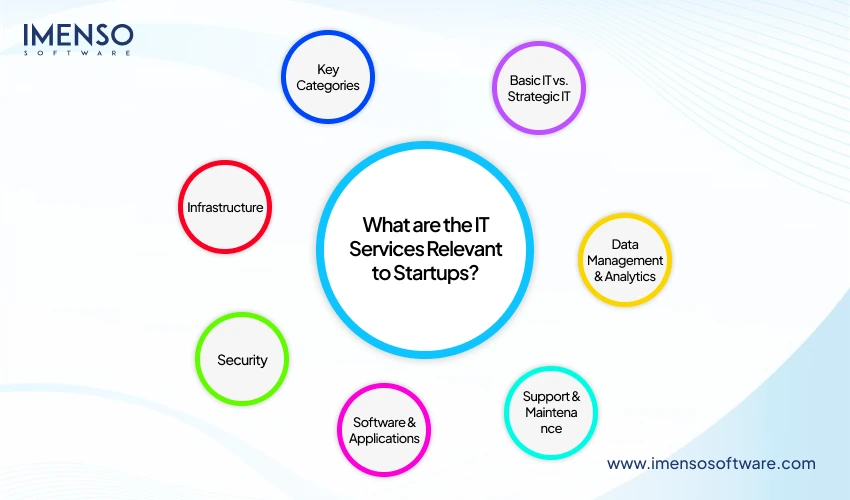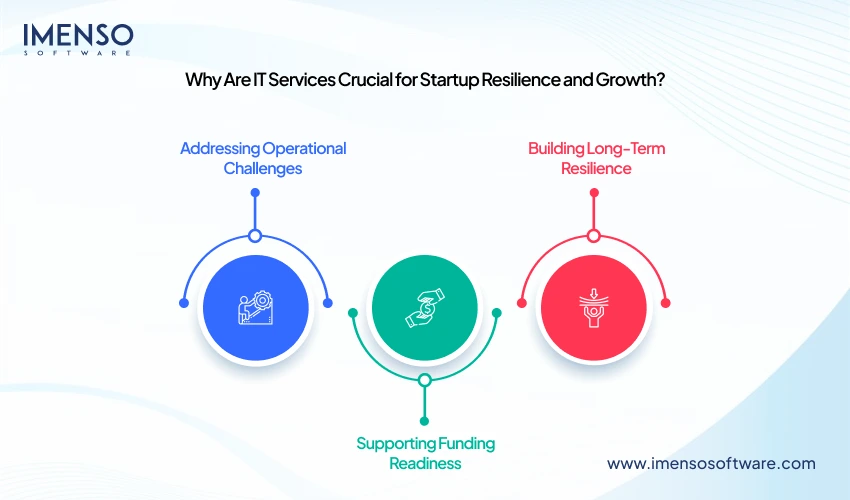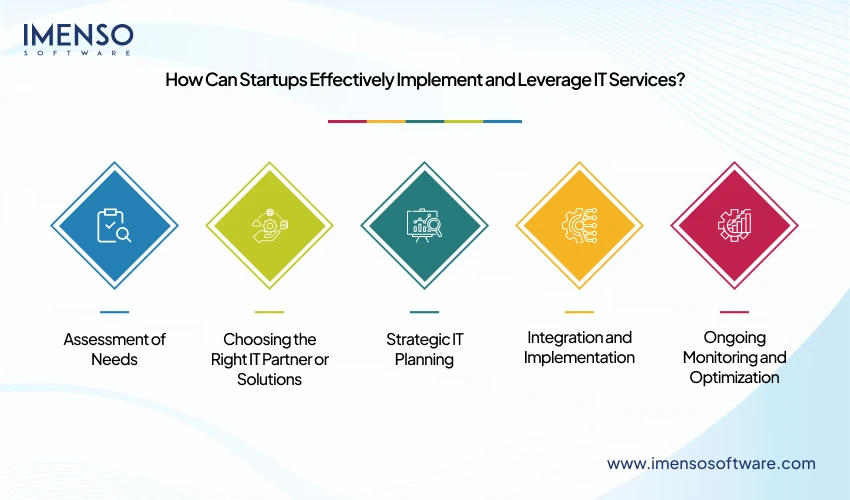The Role of IT Services in Building Resilient Startup Ecosystems

Scaling up a startup is an exhilarating journey and an enormous challenge. Efficient IT services play an important role in scaling up the startups. Founders leading 200-person teams in rapidly growing companies face many challenges. One of the biggest struggles is scaling operations efficiently without losing agility.
While scaling the startup, every process must be optimized, and every decision must align with the company’s fast-evolving goals. The pressure to deliver rapid growth is overwhelming. This pressure is especially intense when the stakes are high.
IT services can streamline workflows and automate tasks, making startups more agile. They also provide scalable infrastructure to help startups stay agile and drive growth. They are essential for achieving short-term goals. They are also essential for long-term aspirations of market leadership. This article explores how IT services can transform operational challenges into opportunities. It also discusses how these services foster sustainable growth and resilience in startup ecosystems.
What are the IT Services Relevant to Startups?

The startup ecosystem relies on IT services for technology solutions and support mechanisms. These services are vital for operational performance and strategic boom. These consist of outsourced IT support, cloud computing, cybersecurity, data analytics, software program improvement, and IT consulting. They manage everyday operations. They enable startups to scale and innovate efficiently.
Key Categories
Startups need the right technology tools to thrive in a competitive landscape. IT services provide the infrastructure and support for growth, innovation, and operational efficiency. They enable businesses to thrive. Here are the key categories of IT services that are crucial for startups to succeed.
Infrastructure
Startups rely on robust infrastructure for smooth operations. This includes cloud-based solutions and services like AWS or Google Cloud. It also includes server management, networking solutions, and scalable storage options. These tools allow startups to adapt to increasing demands. They do so without requiring heavy upfront hardware investments.
Security
Startups handle sensitive customer data and intellectual property, making cybersecurity critical. This is especially authentic for startups as they are extra prone to cyberattacks. IT services provide data protection measures and regulatory compliance guides (e.g. GDPR). They also provide advanced tools to safeguard against cyber threats.
Software & Applications
Startups need tailored software solutions. CRM systems and ERP tools are examples of such solutions. Collaboration platforms and project management tools are vital for streamlining communication and workflow. They are essential for growing teams.
Support & Maintenance
IT support services to minimize downtime. They achieve this through help desks, technical troubleshooting, and regular system updates. This proactive maintenance helps startups avoid disruptions. These disruptions can impact productivity and customer satisfaction.
Data Management & Analytics
New startups need efficient data storage and management. This is because they collect and process increasing volumes of information. IT services provide access to business intelligence tools, predictive analytics, and customizable reporting. These tools enable strategic decision-making.
Basic IT vs. Strategic IT
Startups must go beyond basic IT setups, such as email systems and website hosting, to adopt strategic IT planning. Basic IT ensures operational readiness. Strategic IT focuses on adjusting technology with long-term business goals. This involves:
- Designing scalable systems that grow with the company.
- Implementing data-driven tools for informed decision-making.
- Integrating automation to boost efficiency and free resources for innovation.
Startups can proactively address challenges with strategic IT. Strategic IT can also position startups for growth and achieve a competitive edge.
Why Are IT Services Crucial for Startup Resilience and Growth?

Startups operate in fast-paced surroundings. Staying agile and capable is essential in this competitive area. IT services provide the tools and infrastructure necessary for startups to overcome challenges. They also help startups secure funding and build long-term resilience.
Addressing Operational Challenges
Startups face several demanding situations as they grow, from scaling operations to retaining efficiency. IT services provide tools and solutions to address hurdles. This allows startups to stay agile and focused on their goals. Here’s how they help tackle operational challenges.
Scalability: The IT services allow startups to scale operations quickly. They additionally offer startups the ability to do so without extensive upfront prices. Cloud computing, for instance, lets startups make their infrastructure as needed, paying only for what they use. This flexibility ensures they can handle growth without overcommitting resources.
Cost-Effectiveness: Outsourcing IT can save significant costs. Building an in-house IT team can be expensive. Using cloud services can also save costs. For example, an in-house IT setup can be expensive, costing thousands of dollars per month. Cloud-based services like AWS or Azure offer cost-efficient options tailored to startup needs.
Focus on Core Business: Founders can concentrate on product development. They can focus on customer acquisition, and strategy by offloading IT-related tasks. This allows them to focus on their core strengths. IT services handle the backend, freeing up time and resources for what truly matters.
Agility and Flexibility: Startups need to respond quickly to changing market conditions. IT services provide adaptable solutions. These solutions include SaaS tools for team collaboration, analytics, and CRM. These tools help startups pivot and grow with ease.
Supporting Funding Readiness
Securing funding is an important landmark for startups, and IT services play a vital role in making it happen. IT infrastructure helps startups build investor confidence and demonstrate growth potential. It ensures data security and provides actionable insights.
Data Security and Compliance: Investors prioritize startups with strong data protection measures. IT services help establish secure systems that comply with regulations like GDPR or HIPAA, ensuring sensitive data is protected and investor confidence is strengthened.
Data-Driven Decision Making: IT services provide startups with analytics platforms. These platforms, like Tableau, Looker, and Power BI provide actionable insights. These tools track key metrics like consumer acquisition cost (CAC) and churn quotes. These metrics are important for demonstrating company traction to financiers.
Operational Efficiency: Streamlined workflows improve team performance. IT tools like project management software, such as Asana and Jira, help achieve this. Efficient operations make startups more appealing to investors. They signal the ability to manage growth effectively.
Building Long-Term Resilience
Businesses can safeguard operations with the right IT services. Startups need to build long-term flexibility to succeed in a competitive market. An unpredictable market requires a resilient startup. These services also drive innovation and provide a lasting competitive advantage.
Business Continuity and Disaster Recovery: Unexpected activities can disrupt operations. These events consist of cyberattacks and natural failures. IT services provide backups, disaster recovery plans, and systems for business continuity. These measures help minimize downtime.
Competitive Advantage: Adopting advanced IT solutions gives startups a technological edge over competitors. For instance, AI-driven customer service tools or predictive analytics can set a startup apart in crowded markets.
Innovation and Growth: IT services provide access to cutting-edge technologies, fostering innovation. Platforms like AI, IoT, and blockchain offer startups new opportunities. These opportunities allow startups to create unique solutions and capture larger market shares.
These services are not just about technology—they’re about enabling startups to grow smarter, faster, and stronger. IT services address operational challenges and support funding readiness. They also help startups build resilience in today’s dynamic business landscape.
How Can Startups Effectively Implement and Leverage IT Services?

Startups are dynamic environments where agility and efficiency are critical. Leveraging IT services can be a game-changer for scaling up. It can also improve productivity and help businesses stay competitive. Here’s how startups can approach the implementation and utilization of IT services step by step.
Assessment of Needs
Before diving into IT solutions, it’s vital to evaluate the company’s cutting-edge and future IT desires. Start by figuring pain points in workflows, activities, or communication. For instance, a startup aiming to double its employees in a year will need scalable IT infrastructure to support this growth.
Additionally, long-term goals, like entering new markets or handling more data, should be considered. This assessment ensures IT investments align with the business’s growth trajectory. It also helps avoid overspending on unnecessary tools.
Choosing the Right IT Partner or Solutions
The success of IT services often hinges on selecting the right partner or solutions. When evaluating options, consider factors like:
- Expertise and Experience: Look for providers with a tested track record of working with startups.
- Scalability: Ensure the facilities can grow together with your business.
- Cost: Balance affordability with value. Higher straightforward costs can be managed to better long-term returns.
- Security: Data breaches can be devastating, so prioritize robust security measures.
- Support: 24/7 customer support can be a lifesaver during critical issues.
Startups can choose from different IT service models
- Managed IT Services: A one-stop solution where a third party handles IT operations.
- Cloud Providers: Scalable options like AWS or Google Cloud for data storage and computing power.
- Freelance IT Consultants: Ideal for smaller, project-based needs.
Strategic IT Planning
Once the needs and partners are identified, the next step is developing a strategic IT roadmap. This roadmap should align the IT strategy with the company’s business goals. A startup planning to expand its product offerings should outline its IT infrastructure needs. It should also specify the software and tools required for its expansion. This roadmap will support the expansion.
Prioritization and Budgeting are key here. Allocate assets based on the urgency and impact of each initiative. Investing in a consumer dating management (CRM) gadget is important. Upgrading internal communication tools is less important than investing in a CRM device. This is because a CRM system directly impacts customer interactions and satisfaction.
Integration and Implementation
Integration of IT services should be smooth to avoid disrupting existing workflows. Begin with a detailed plan to ensure compatibility with current systems. Integrating a new payment gateway into an existing e-commerce platform should not slow down the checkout process. The checkout process should remain efficient.
Equally important is employee training. Providing the team with the knowledge to use new tools effectively minimizes resistance and ensures maximum ROI. Support during the early stages of implementation, such as a help desk or tutorials, can make the transition seamless.
Ongoing Monitoring and Optimization
IT services are not a one-and-done solution. Startups need to continuously monitor their IT systems to ensure optimal performance. For instance, regular checks can identify bottlenecks in server capacity. They can also help identify cybersecurity risks.
By analyzing performance metrics and gathering user feedback, startups can make necessary adjustments. Optimization may include upgrading tools, scaling systems, or enhancing security protocols. This continuous improvement ensures that IT services remain aligned with the company’s evolving needs.
Moreover, partnering with offshore software development teams can provide startups with cost-effective access to skilled professionals. This approach ensures continuous IT optimization while leveraging global expertise to stay competitive and innovative.
Also read:
How Startups Can Scale Smartly: Leveraging Technology and Services
IT Roadmap for Startups: From Launch to Scalability
Code Refactoring in Software Development: When and Why Do It
FAQs
What is the role of the startup ecosystem?
A startup ecosystem is made up of individuals, startups at different stages, and other kinds of organizations in a real or virtual place that work together to build new startup businesses.
What is the role of digital technology in startups?
A startup’s success can be greatly impacted by digital technology in several ways, such as:
Bringing Idea:- Entrepreneurs may swiftly obtain information to comprehend the industry and competitors with the aid of ideation technology.
Market analysis:- Startups can use technology to gather and examine data about their target market, including consumer trends, preferences, and issues.
Promotion:- Startups may use digital marketing to enlarge their audience, amplify brand recognition, and boost sales. Influencer marketing, social media, and targeted campaigning are all tools that startups may employ to advertise their goods.
Experience of the customer:- Data analytics may be used by startups to examine consumer behavior and suggest goods or services that consumers are likely to find appealing. To provide a positive client experience, they can also employ chatbots and AI-powered customer service.
What are the top 05 startup ecosystems?
These are the world’s top five startup ecosystems:
- Silicon Valley: The world’s top-ranked city
- New York City and London are tied for second place.
- London and New York City are tied for second place.
- Los Angeles: ranked fourth
- Tel Aviv is ranked fifth.
How to build a startup ecosystem?
Building a startup ecosystem begins with fostering a collaborative community. Connect entrepreneurs, investors, mentors, and service providers to create an environment of knowledge sharing and support. Next, establish resources like co-working spaces, funding opportunities, and training programs to empower startups with tools and guidance for growth. Finally, promote innovation by encouraging partnerships, hosting events, and celebrating success stories.
What are the challenges of the startup ecosystem?
The startup ecosystem faces challenges like limited funding, making it difficult to scale and sustain operations. Securing investments while managing cash flow demands strategic planning and efficient resource allocation.
Final Wordings
IT services are essential for building resilient startup ecosystems. They provide the tools and infrastructure for scaling operations. They also provide the tools and infrastructure for maintaining efficiency and securing data. These services help startups overcome challenges like cost, security, and agility. This enables startups to adapt and thrive in a competitive market.
They help startups prepare for funding rounds. They also drive innovation and ensure long-term business continuity. Startups can transform operational hurdles into opportunities for growth and success with the right solutions. These solutions enable startups to overcome challenges and achieve success. Partner with Imenso Software to harness the power of IT services and build a strong, resilient ecosystem for your startup.
Check us out on Clutch to see our client reviews and project portfolio.
Want more information about our services?
Similar Posts

5 Signs You Need an Offshore Development Team to Scale Your Tech Startup
Imagine you are launching a tech startup and working hard towards making it great. At first, everything runs smoothly. But as your product gains more traction, problems show up. Your team feels overworked, deadlines keep getting pushed back, and costs rise. Similar issues concern big companies. IBM dealt with the same problems too. In the […]...

How to Perform a Competitive Analysis: A Guide for Startups
Have you ever wondered how Netflix went from DVD rentals to streaming big? It all started with mastering competitive analysis. Netflix and Blockbuster were rivals in the DVD rental and video store market. However, only one of them changed with the times. Netflix took the chance to revolutionize the market with streaming. Blockbuster held the […]...

Best Time Zones & Countries for Hiring Offshore Developers in 2025
All businesses are under constant pressure to be innovative, ranked, and remain competitive. Yet, having and managing an in-house development team is costly and time-consuming. This is most often observed in startups and mid-sized businesses. Scenarios like these are where offshore development occurs. It taps into global talent, cuts operating costs, and allows for 24/7 […]...









